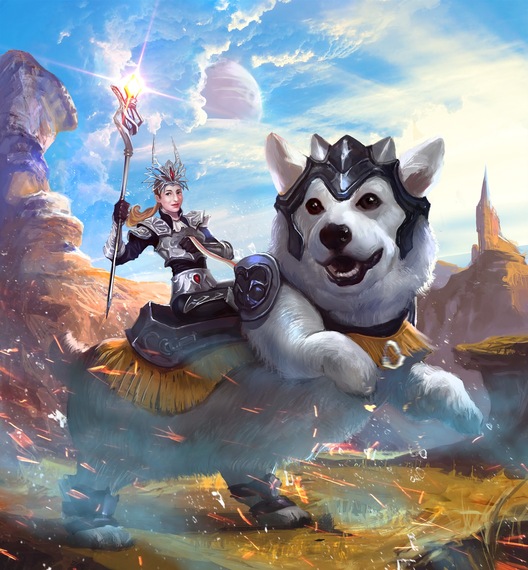
Portrait commissioned from Bloodyman88 on ArtCorgi.com
Through my company, ArtCorgi.com, I help people have portraits made. As the site's client and artist liaison, I have learned some fascinating things about the way we perceive ourselves and those around us.
In an age in which we have immense control over how we appear (in social media, at least), we have developed increasingly-skewed self images. Along with our love of using filters and effects to manipulate our photos, we have developed a taste for caricatures and cartoons over realistic portraits. We are stepping away from reality and entering a fantasy world.
This in itself is not a bad thing. The problem is that we do not realize it is happening. And when we encounter images of ourselves that do not reinforce our fantasies, we break.
Really. I am the one who sees it happen.
The Uncanny Valley Effect
When a client orders a realistic portrait from my network, my stomach immediately curls into knots. Not only are people far less likely to be satisfied with realistic, highly-detailed portraits; they are likely to become very, very angry with me (I manage all artist and client communication, so complaints go directly to my personal inbox). It is not uncommon for clients to unleash outright attacks on my personal character and assertions that their artists were intentionally sabotaging their work.
Capturing a person's likeness is difficult. This is why even top-notch portraits can be controversial (remember the mixed reviews accompanying the Duchess of Cambridge's official portrait?). This could be partially due to the uncanny valley effect we experience when seeing CG characters that are meant to look human, but aren't quite right somehow (consider the 2004 Polar Express film as an example).
But there is more to unsettling realistic portraits than that. If the issue at hand simply had to do with accuracy, I would encounter fewer passionately angry clients. After all, a simple side-by-side comparison and suggestion like "The dimple needs to be more visible" or "I think it would look more like me if we made the cheekbones slightly more prominent" would resolve the issue.
Lying at the core of people's dissatisfaction with their portraits seems to be what they perceive to be a fundamental threat to their self image- one that can only be resolved by attacking the insidious forces who seek to break it down.
Your Self Image is Stylized
While realistic portraits are risky, clients typically love stylized, cartoony, anime-style, and comic-style portraits they commission from ArtCorgi.com. But why? These pieces are typically less expensive, less detailed, less carefully-colored, and created with less thought, skill, and consideration. They are also, objectively, less accurate. Why do people think less accurate images better represent them?
My hunch is that people like stylized portraits of themselves because their chosen styles reflect their self images.
Someone who sees himself as strong will love being depicted in a comic-inspired style, as that genre plays up muscular features, strong physiques, and assertive postures. Someone who sees herself as beautiful will love many of our cartoony and anime styles, which play up graceful poses, big, wide eyes, flawless skin, and expressions free of worry and fatigue.
In short, by having stylized portraits of ourselves made, we can exercise more control over how we come across.
Your Image of Others is Stylized
In addition to seeing caricatures of ourselves, we see other people in caricature form. Perhaps this is why artists have difficulty copying likenesses even in realistic styles, and why we find that one client might think a portrait of someone is perfect while his mother might think the portrait is all wrong.
This becomes an issue when artists are responsible for illustrating or painting others, because they also see images of subjects that are different from reality. And if they are not drawing in a stylized manner, those images will be very... honest.
Here is where illustrated and painted portraits of people can reveal things about their character that photographs cannot. When we see photographs of ourselves that clash with our self images, we can shrug them off, saying "Oh, that was just a bad angle." But when an artist draws a realistic portrait of us from a reference photo we share- one showing us from our best side and angle, in the best lighting, and with the best expression- and it still clashes with our self images, we have to confront a tough reality. That someone else sees us in a way that we don't like to see ourselves.
Acknowledge Your Skewed Reality and You Can Convince Others it is Real
Having a bunch of portraits drawn of myself has helped me improve my own self awareness and self image. I have been mortified by some artists' interpretations of me and elated by others. What heightened my self-awareness was the realization that my satisfaction with portraits had nothing to do with quality and everything to do with self image.
It is not a bad thing that people want portraits of their fantasy selves. I prefer that people have their aspirational selves drawn. That is the point!
We simply must become self-aware enough to discover who our fantasy selves are and remember that others may see us differently. This enables us to not only manage our public presentation well, but direct others to see us as we want to be seen. This is why my most self-aware clients know exactly what they want to commission from me and are consistently happy with their artists' final portraits.
Here is the bottom line: Our self-images are becoming increasingly skewed. But that is OK. If we acknowledge we are buying into a personal fantasy, we can develop a fantasy persona so compelling that even others become caught up in it. Complain all you want about delusions of grandeur, but I would much rather live in a world of strong, fascinating characters than lost souls who have yet to discover themselves and their core values.